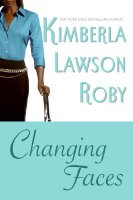Wednesday, June 07, 2006
CHANGING FACES by Kimberla Lawson Roby
 Doris Dixon reviews CHANGING FACES by Kimberla Lawson Roby (Morrow, 2006).
Doris Dixon reviews CHANGING FACES by Kimberla Lawson Roby (Morrow, 2006).Whitney, Taylor, and Charisse have been best friends for years. They meet every Wednesday for lunch and call each other frequently. Their bond is threatened when Whitney can no longer tolerate Charisse's need to control EVERYTHING. When Charisse cruelly insults her for being overweight, Whitney decides to reveal one of her friend's darkest secrets. However, Whitney will have to wait in line. Charisse's husband Marvin, tired of being under his wife's thumb, has a few scores of his own to settle. How will the volatile and dangerous Charisse react to these threats?
Changing Faces is entertaining and engaging. We follow the trials and loves of Taylor and Whitney and wonder why they have tolerated Charisse for so long. Taylor is a successful attorney in line to become a partner at a prestigious Chicago law firm. She is troubled by a competitive co-worker who resents her success; painful menstrual cycles; and a long-time boyfriend who will not commit. Perhaps the most likeable character is Whitney, a customer-service manager. She also has difficulty in relationships, but is sure that all her problems come from being overweight.
I have not yet read Kimberla Lawson Roby's popular series of books about the notorious Rev. Curtis Black (Casting The First Stone, Too Much of A Good Thing, and The Best Kept Secret). How does the dangerous, hypocritical, bible-thumping Charisse compare to Curtis Black?
Doris Dixon, Raleigh Branch Library
Labels: African-American Fiction, Reviews by Doris Dixon
Comments:
I have some questions about where Roby's Changing Faces fits into the larger landscape of African American culture:
Are book publishers, sellers, and librarians paying enough attention to the vast distinctions among the African American fiction available today?
How would you classify Roby's book? It's not urban/street or erotic or romance or christian/spiritual. Perhaps its mainstream. But is there a category for "African American Mainstream"?
Do readers looking for a good book care about such distinctions? Perhaps they/we rely on recommendations, cover art, dust jacket descriptions, and the reputation of the author.
Writer Nick Chiles has spoken out recently about the 'lumping together' of all African American fiction at bookstores (and libraries?)
What does Kimberla Lawson Roby think of all of this? Comments made by Whitney, the most sympathetic character in Changing Faces suggest that the author would be offended if her books were lumped together with urban fiction. Whitney is a customer-service manager for a cell phone provider. She is confronted by a "ghetto" (her words, not mine) customer who demands excessive perks for her dropped calls. In telling the story to her friends, Whitney asserts that "Bill Cosby was right."
Post a Comment
Are book publishers, sellers, and librarians paying enough attention to the vast distinctions among the African American fiction available today?
How would you classify Roby's book? It's not urban/street or erotic or romance or christian/spiritual. Perhaps its mainstream. But is there a category for "African American Mainstream"?
Do readers looking for a good book care about such distinctions? Perhaps they/we rely on recommendations, cover art, dust jacket descriptions, and the reputation of the author.
Writer Nick Chiles has spoken out recently about the 'lumping together' of all African American fiction at bookstores (and libraries?)
What does Kimberla Lawson Roby think of all of this? Comments made by Whitney, the most sympathetic character in Changing Faces suggest that the author would be offended if her books were lumped together with urban fiction. Whitney is a customer-service manager for a cell phone provider. She is confronted by a "ghetto" (her words, not mine) customer who demands excessive perks for her dropped calls. In telling the story to her friends, Whitney asserts that "Bill Cosby was right."



